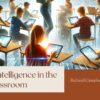Long recognized as a critical element in learning outcomes, student engagement in the classroom is crucial. Since artificial intelligence (AI) technology has advanced, educators now have new opportunities to promote and support student engagement. The potential that AI has to increase student engagement and how this can be used to enhance learning outcomes will be covered in this article.
Understanding Student Engagement

Recent studies have highlighted the significance of student engagement in enhancing academic success as a crucial part of the learning process. Enhancing student engagement has become simpler for educators thanks to the adoption of AI technology in education. Teachers can better engage their students by adjusting their teaching strategies with the aid of AI, which can help them spot patterns in their behavior.
Personalized learning experiences powered by AI are one of the ways that technology is improving student engagement. By analyzing student data, teachers can create individualized lesson plans that cater to each student’s strengths and weaknesses.
This approach helps students stay engaged and provides educators with a targeted approach to address specific areas of improvement.
AI technology also offers the advantage of providing immediate feedback to students. Whether answering questions or completing assessments, students receive instant feedback on their work.
This feedback helps students stay motivated and engaged, creating a sense of accomplishment that further boosts overall engagement levels.
In conclusion, the integration of AI technology in classrooms provides opportunities to improve student engagement levels, leading to better learning outcomes for all students involved.
By leveraging the capabilities of AI technology, educators can create personalized learning experiences and provide instant feedback, which fosters student engagement and ultimately promotes academic success.
The Importance of Student Engagement
Previous studies have shown the importance of student engagement in enhancing academic success. It is a crucial part of the learning process. It is now simpler for educators to increase student engagement thanks to the adoption of AI technology in education.
Teachers can use AI to recognize patterns in student behavior and modify their teaching strategies to increase student engagement.
One way that technology is enhancing student engagement is through personalized learning environments powered by AI.
Teachers can develop specialized lesson plans that address the strengths and weaknesses of each student by analyzing student data. This strategy keeps students interested while giving teachers a focused way to work on particular areas that need improvement.
AI technology also offers the advantage of providing immediate feedback to students. Whether answering questions or completing assessments, students receive instant feedback on their work. This feedback helps students stay motivated and engaged, creating a sense of accomplishment that further boosts overall engagement levels.
In conclusion, the incorporation of AI technology into the classroom offers chances to raise levels of student engagement, which enhances learning outcomes for all students.
By utilizing AI technology’s capabilities, teachers can design personalized learning experiences and give immediate feedback, which increases student engagement and ultimately encourages academic success.
AI Tools for Student Engagement
AI tools are becoming increasingly popular in the education sector, particularly when it comes to student engagement. These tools provide personalized learning experiences that cater to each student’s unique needs and interests.
AI-powered chatbots, for example, can answer students’ questions in real-time and offer guidance on topics they may be struggling with. This level of instant support can help keep students engaged and motivated throughout their studies.

Another way AI tools are boosting student engagement is through virtual reality (VR) and augmented reality (AR) technology. By incorporating VR and AR into lessons, teachers can create immersive learning experiences that capture students’ attention and make complex concepts easier to understand. For example, VR programs like CoSpaces could allow history students to explore ancient ruins, or an AR app could bring biology lessons to life by overlaying interactive 3D models onto real-world objects.

In conclusion, AI tools have the potential to revolutionize the way we approach teaching and learning. By providing personalized support and creating immersive experiences, these technologies are helping educators boost student engagement levels and ultimately improve learning outcomes.
As we continue to innovate in this space, we can expect even more exciting developments that will transform the educational experience for generations to come.
The Benefits of AI in Student Engagement
Personalizing learning experiences is one of the main advantages of using AI in student engagement. AI can offer individualized feedback, recommendations, and resources that are pertinent to each student’s needs by analyzing data on their performance and behavior.
Students who can see how their learning is directly related to their progress feel more invested in their own learning as a result.
Moreover, AI-powered chatbots and virtual assistants can act as 24/7 support systems for students, providing personalized attention and assistance.
They can answer questions about assignments or coursework, provide reminders or notifications about upcoming deadlines, and even offer emotional support when needed.
This kind of personalized attention helps students feel more connected to their studies and encourages them to stay focused on achieving their goals.
Furthermore, the use of AI in online education platforms has made learning more accessible than ever before. With features like automatic captioning and translation, students who may have previously struggled with language barriers or hearing impairments now have equal access to course materials.
These tools help create a more inclusive learning environment that empowers all students to succeed.
In general, incorporating AI technology into education offers students a variety of advantages, from more individualized learning opportunities to increased accessibility and support. These benefits have the potential to fundamentally alter the way we approach education and encourage everyone’s academic success.
Examples of AI in Student Engagement
In the context of student engagement, AI has emerged as a crucial element of contemporary education. A prime example of how AI can be applied to raise student engagement is in personalized learning programs.
According to each student’s individual learning needs, teachers can use machine learning algorithms to create custom lessons and assignments that will boost student engagement and performance. Personalized learning programs can raise student happiness and engagement by letting students learn at their own pace.
Chatbots and virtual assistants are another example of AI in student engagement. These tools offer immediate assistance and support to students who need help with a particular topic or assignment.
As chatbots and virtual assistants are available 24/7, students no longer have to wait for office hours or the next class to receive help. This can lead to an increase in student engagement as they feel supported and encouraged to continue learning.
AI-powered feedback systems are also gaining popularity in classrooms worldwide as they provide instant feedback on student assignments.
Natural language processing technology can analyze written assignments, identify grammar and syntax errors, and provide suggestions for content organization and writing style. This type of feedback can help students improve their writing skills while also boosting their confidence levels by providing positive reinforcement for their efforts.
This, in turn, can lead to an increase in student engagement as they feel more confident and supported in their learning.

ChatGPT, a language model, can also be used to increase student engagement by providing personalized feedback and support. It can analyze student work and provide real-time feedback, generate quiz questions, and offer personalized study materials based on each student’s unique learning needs. With its advanced natural language processing capabilities, ChatGPT can help students improve their writing skills and language proficiency while also encouraging them to continue learning.
Overcoming Challenges in AI-Driven Student Engagement
A novel and exciting idea in education, AI-powered student engagement has the potential to completely change how students learn. To ensure that it is implemented effectively, educators must overcome some serious obstacles. Making sure that students don’t solely rely on AI for their learning is one of the biggest challenges. While artificial intelligence can support educational techniques, it cannot replace the value of human interaction and experience.

Another challenge is ensuring that AI systems remain unbiased in their assessment of student performance. Developers must ensure that machine learning algorithms do not reinforce existing biases or discriminate against specific groups based on factors like race, gender, or socio-economic status. Regular updates and audits are necessary to ensure ongoing accuracy.
Lastly, implementing AI in education can be costly and require significant resources, such as infrastructure upgrades or specialized training for teachers. Institutions must carefully assess the return on investment before investing in these systems while being mindful of potential privacy concerns with the data collection processes involved in using AI for student engagement.
The use of AI must be balanced with more conventional teaching techniques, unbiased assessments must be made, and a careful analysis of the return on investment must be made in order to ensure effective implementation. The potential for AI-driven student engagement to revolutionize education must be weighed against potential drawbacks.
Moreover, AI could be used to support student engagement beyond the limitations of traditional teaching methods. ChatGPT, an AI model, can help improve student engagement by answering questions, providing feedback, and generating personalized content. ChatGPT can also help analyze student data, which can be used to tailor lessons and assignments based on individual needs, thus improving student engagement and outcomes.
The Future of AI and Student Engagement
Artificial intelligence (AI) has the potential to revolutionize the traditional classroom teaching system. AI tools can help teachers personalize learning for every student, so they can get a more individualized experience as compared to the one-size-fits-all approach.
With AI, students’ progress can be tracked in real-time, and their strengths and weaknesses can be identified more easily. Teachers can leverage this data to adjust their curriculum to better suit each student’s requirements.
Moreover, AI-powered chatbots have become increasingly popular with educational institutions worldwide. These chatbots act as personal assistants for students, providing them with immediate answers to their queries 24/7.
This is particularly useful in higher education because it reduces wait times and improves accessibility for students who are studying remotely or at odd hours.
Integrating AI into classrooms could lead to a more efficient and effective learning experience for both students and teachers alike. It will allow educators to focus on areas where human expertise is indispensable while reducing the burden of repetitive tasks that consume time unnecessarily.
Students will benefit from personalized learning experiences that cater specifically to their needs while being able to access academic support continuously through chatbots.
Ethical Considerations in AI-Driven Student Engagement
There are many benefits to using artificial intelligence (AI) in education, but it also brings up ethical issues that need to be addressed. Private information is one of the main issues. Schools are responsible for ensuring the security and moral use of student data. For instance, according to a recent study, schools need to make sure that third-party vendors who offer AI-powered tools abide by laws like FERPA (Family Educational Rights and Privacy Act).
Bias in algorithms is a different problem. Like any technology, artificial intelligence (AI) systems are susceptible to bias based on attributes like race, gender, or socioeconomic status. To prevent these biases from affecting how educational opportunities are presented to students, for instance, it’s imperative.
Finally, there is a need for transparency in how AI-powered tools are being used in classrooms. Students should know when they’re interacting with automated systems versus human instructors and understand how their data is being used.
Teachers should also receive adequate training so they can effectively use these tools while still maintaining an ethical approach to education. By addressing these ethical concerns, schools can reap the benefits of AI-driven student engagement while also protecting their students’ rights and privacy.
Conclusion
AI implementation in education has the ability to revolutionize the learning experience for students, leading to better academic outcomes and engagement. By creating personalized learning plans and providing real-time feedback on progress, students can retain knowledge more effectively and achieve greater success in their academic pursuits.
However, it is essential to strike a balance between technology and human interaction to ensure that ethical issues such as algorithmic bias and privacy concerns are addressed.
By taking into account these crucial factors, educators can leverage AI-driven student engagement to its fullest potential while upholding students’ rights and welfare. As a result, the implementation of AI in education can have a profound impact on the future of learning.









Recent Comments